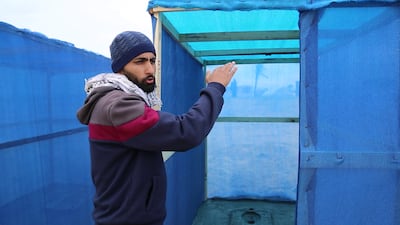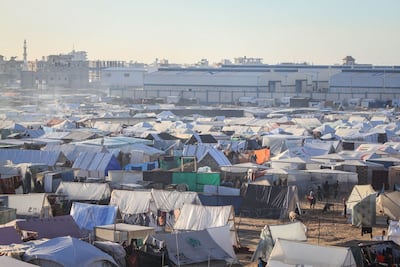Live updates: Follow the latest news on Israel-Gaza
Three weeks after the war on Gaza broke out, Yahya Al Qassas, 28, wanted to make a change. Determined to help solve some of the seemingly compounding issues facing Gazans, he began distributing blankets to people in need, just as temperatures were beginning to drop.
Shortly afterwards, donations began to come in, Mr Al Qassas said, and close friends turned into teammates.
Today, Mr Al Qassas's One Body initiative has a GoFundMe account that has raised about $10,000.
"We started building tents, 18 in total, inside displacement camps, by just finding families that were living on the streets," he said.
Donations go towards the purchase and distribution of medicine, blankets, sleeping bags, nappies, food and building tents.
As well as offering blankets and tents, Mr Al Qassas and his team started to source materials to build toilets for people in displacement camps, and eventually, shelters, as needs grew beyond availability.
Ahmed Al Faraa, 46, who was displaced from Gaza's southern city of Khan Younis, is one of hundreds of Palestinians who have been helped by the initiative.
He now lives in the Tall Al Sultan refugee camp in Rafah, on the border with Egypt, together with 20 other families, all living in tents.
The toilets built through Mr Al Qassas's initiative have been very helpful, Mr Al Faraa said, especially for the women in his family. Although basic, the toilets were more accessible than other options they had.
"The nearest toilet was at least 1km away," Mr Al Faraa told The National. "And once we got there, we had to wait in line, with about 100 to 120 people ahead of us."

By the time they got to the front of the queue, the toilets were not in a good condition, he added.
The UN has said Gazans in overcrowded spaces are foregoing what little food and water they can find to avoid having to use unsanitary toilets.
Amid a lack of basic hygiene, displacement camps and UN schools, where thousands of people are seeking shelter, have become hotbeds of diseases like Hepatitis A, with at least 8,000 cases recorded due to people's close proximity to sewage and waste.
Despite all of the work that has been done, Mr Al Qassas said it had been difficult to source materials including nylon, and prices are rocketing amid the scarcity.
One nail at a time, he and his team join wooden planks and nylon panels, which are becoming increasingly difficult to find as Israel continues its blockade on Gaza. The shortage of essential building tools and materials, like hammers, steel and cement, leaves people like Mr Al Qassas – and millions in need of shelter – with little to work with.

In these conditions, Mr Al Qassas and his team are resorting to using whatever they can find.
"We use car tyres to create the shape of the well, which a pipe flowing out of the toilet travels into," he said.
This temporary fix requires constant maintenance, as the infrastructure for a proper sewage system has either been destroyed or did not exist to begin with, in places that have seen a sudden increase in their population, such as Al Mawasi, which Israel has designated as a "safe zone" for Gazans.
The next project, Mr Al Qassas said, involves building shelters for people in need, using the funds that continue to flow in from all over the world, one click at a time.
